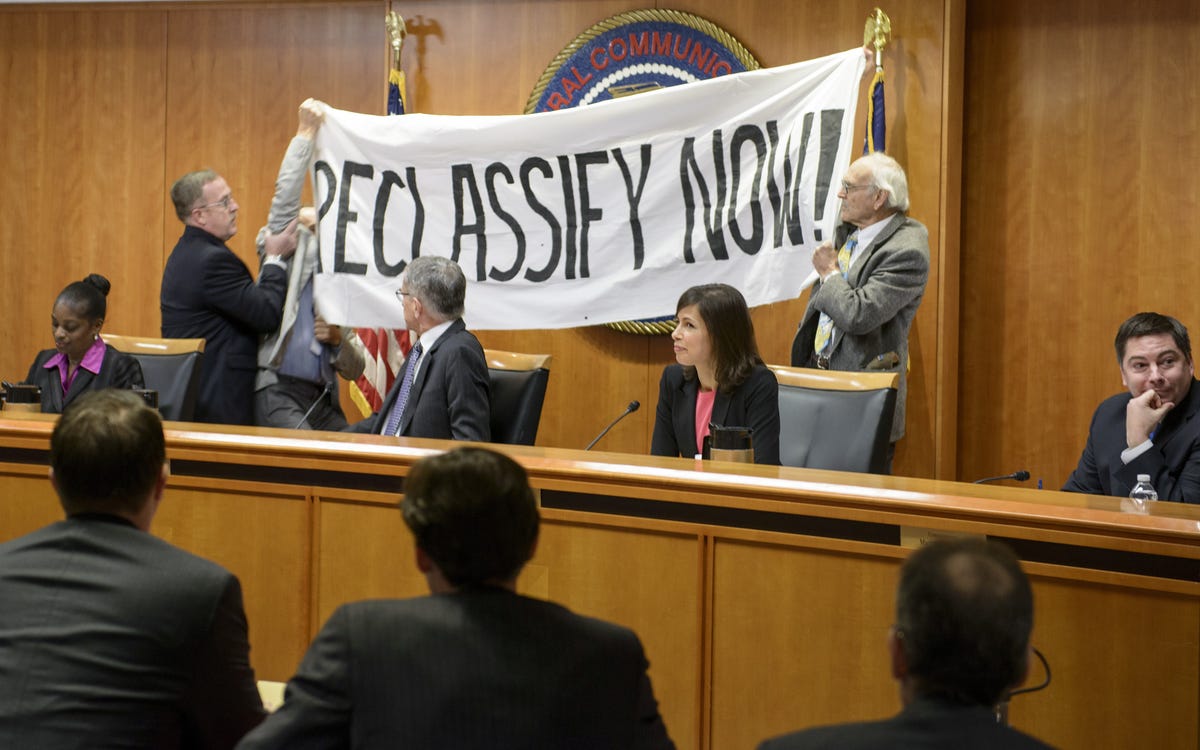
Brendan Smialowski/AFP/Getty Images
The Federal Communications Commission’s open Internet rules will take effect on Friday as planned after a federal court rejected requests by opponents to delay the rules pending lawsuits against the agency.
A three-judge panel of the US Court of Appeals for the DC Circuit on Thursday denied a request filed by wireless and broadband industry groups to delay the FCC’s adoption of so-called Net neutrality rules. The court’s denial of the request means that the new rules, which reclassify broadband as a public utility and prohibit broadband providers from slowing down or blocking Internet traffic, will go into effect as planned on Friday, June 12.
The ruling by the court comes as a relief to the FCC, which is facing several lawsuits over the rules, which were approved by a 3-2 vote in February.
The Net neutrality regulations are based on a new definition of broadband that lets the government regulate Internet infrastructure as a public utility. The rules prohibit broadband providers from blocking or slowing down traffic on wired and wireless networks. They also ban Internet service providers from offering paid priority services that could allow them to charge content companies, such as Netflix, fees to access Internet “fast lanes” to reach customers more quickly when networks are congested.
FCC Chairman Tom Wheeler called the ruling on Thursday a huge victory for Internet consumers and innovators.
“Starting Friday, there will be a referee on the field to keep the Internet fast, fair and open,” he said. “Blocking, throttling, pay-for-priority fast lanes and other efforts to come between consumers and the Internet are now things of the past. The rules also give broadband providers the certainty and economic incentive to build fast and competitive broadband networks.”
The FCC’s rules were adopted in February and were published by the government in April. Following a standard 60-day waiting period, the rules go into effect on Friday.
Related stories
- FCC chairman seeks Net neutrality backing from TV broadcasters
- AT&T adds another lawsuit to the Net neutrality pile-on
- Cable and wireless industries sue FCC over Net neutrality rules
- Sprint CEO: Without Net neutrality rules, we’re toast
Broadband providers have said they are willing to accept the basic principles outlined in the Net neutrality rules that prevent broadband providers from blocking or degrading traffic on their networks and prevents operators from offering “fast lanes” that deliver some content, like Netflix videos, faster than other content. But they are vehemently opposed to the FCC’s reclassification of broadband as a public utility like the old-style telephone network.
Opponents claim this approach will lead to government rate regulation and will stifle investment in networks. Meanwhile, Net neutrality supporters argue that the rules are necessary to prevent operators from acting as gatekeepers to the Internet. They claim that reclassifying broadband was the only way to make sure the rules withstood legal scrutiny.
AT&T, the National Cable and Telecommunications Association, the U.S. Telecom Association and the CTIA mobile trade group are among a handful of groups that filed suit against the FCC in April accusing the agency of overstepping its authority when it decided to treat broadband like a public utility.
These groups also asked the court to put the rules on temporary hold while the lawsuit against the FCC was ongoing. In a brief statement, the DC Circuit judges stated that the Internet providers “have not satisfied the stringent requirements” to block the rules while their underlying lawsuit is pending.
CTIA President Meredith Attwell Baker acknowledged that the court’s ruling was a disappointment, but not unexpected. She vowed to continue the fight.
“While the stay decision is disappointing and a loss for consumers, securing a judicial stay is always a challenge given the extremely high standards,” she said in a statement. “The case is just beginning and the stakes are high.”
Efforts in Congress to craft legislation that would make basic Net neutrality rules law, but would not treat broadband as a utility, have largely stalled. A win for the Internet providers could have forced a compromise from Democrats. Meanwhile, congressional Republicans are attempting to prevent the FCC from enforcing its Net neutrality rules by including amendments in a must-pass budget bill. The provision would have to be passed by both the Senate and House of Representatives and still get President Barack Obama’s signature. The president has been a strong supporter of Net neutrality and ahead of the FCC’s vote, urged the agency to reclassify broadband.




